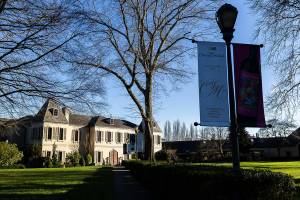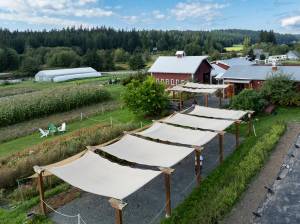Wenatchee fruit farm adds compost to its mix
Published 9:49 pm Sunday, August 17, 2008
WENATCHEE — Tucked away, out of sight and out of mind on the northwest edge of a hill, is an unusual farm.
The windrows on this farm are not made of hay. They consist of smelly, rotting fruit, horse manure, wood chips, leaves, grass clippings and hydrated lime.
This is the Kyle Mathison compost farm, part of Kyle Mathison Orchards, about seven miles south of Wenatchee. At 14 acres, the compost operation is probably the largest in the area.
It’s where Mathison, president and controlling owner of Kyle Mathison Orchards, makes an organic humus-soil fertilizer for his orchard.
Trucks deliver loads of cull apples, pears and cherries that aren’t good enough for juicing from warehouses of Stemilt Growers Inc., owned by the Mathison family. Leaves come from the warehouses, too.
Spring prunings from fruit trees at the orchard are chopped into wood chips. Grass clippings come from his orchard and horse manure is delivered from Appleatchee Riders in Wenatchee.
Cow manure from a Quincy dairy was used, but it created too much potassium in relation to calcium. The manure was discontinued and hydrated lime was added to increase the calcium. The lime comes from Stemilt warehouses after it absorbs extra carbon dioxide produced by controlled-atmosphere apple storage.
Mathison, 55, is in the fourth generation of a family that dates back to 1893 and has grown tree fruit in the Wentachee area since 1914. He is vice president of research and development and Chile operations for Wenatchee-based Stemilt Growers Inc., one of the largest tree fruit companies in North America and the top one in cherries.
Mathison’s son, West, is president of Stemilt. His father, Tom, is past president and chairman of the board.
Kyle Mathison spends most of his time running Kyle Mathison Orchards, which has hundreds of acres of tree fruit, mainly cherries, here, near Bakersfield, Calif., and in Chile. He won’t say how many acres his company has and downplays the size of both companies, saying, “We’re a family operation, scratching the dirt for over 100 years, trying to make a living.”
Mathison began compost farming in 2005. He had been to a workshop in Yakima the year before and liked what he heard from composting experts: Arden Andersen, a medical doctor and agronomist from Michigan, and Craig Witt, a compost and fertilizer consultant from Nevada.
“Andersen said nutritional values and taste and flavors of fruit are greater if trees are armed with high-quality compost,” Mathison said.
Speaking with his typical enthusiasm, he continued, “Our goal was to try to enhance the complexity of flavor and sugar content of cherries and also of wine grapes, apples, blueberries and pears.”
That’s being done, he believes. He said he’s noticed improvement in taste and that cherry sugars, normally at 20 percent of cherry juice, are up to 22 percent to 24 percent after three years.
At the workshop in Yakima, Witt emphasized composting is science and art, Mathison said.
Compost has to have the right ratio of carbon to nitrogen, with fruit waste and manure supplying most of the nitrogen and wood chips supplying most of the carbon, he said. Wood chips are coarse, helping with aeration, and reduce odors when quickly applied to cover rotting fruit and horse manure, he said.
The smell wasn’t bad when The Wenatchee World visited. The composting operation is located so that prevailing winds blow the smell into Mathison’s adjacent cherry orchard. When the wind shifts toward a nearby creek, Mathison ceases turning compost windrows to reduce smells for neighbors.
Temperature is the key to having fungal microbes digest carbons and produce the best humus for trees, he said.
“You don’t want to let the compost get too hot or too cold. We turn it and aerate and water it with our mechanical turner, ideally when the compost is between 140 and 143 degrees,” Mathison said.
“So you have to turn it every day for the first couple of days, then every other day and then every third day or twice a week for a while and then, toward the end, once a week,” he said.
The turning machine is a large auger, towed by a tractor, that churns through 4-foot-tall, 8-foot-wide windrows of compost. The tractor creeps along at 70 to 110 feet per minute. Water is sprayed into the mix, helping microbes do their work.
Normally, it takes about two months to make the humus and very little is produced from mid-November to mid-March because it’s too cold for microbes.
“If it gets too warm, the carbon turns into black coal. We want it to be brown humus, so were careful not to overcook it if it gets too hot,” Mathison said. “It’s like a medium-rare steak. We want it juicy. The trees appreciate it. Microbes are most active when the compost is medium rare.”
Mathison produces about 1,600 tons of humus a year, applying it at 4 tons per acre on about 200 acres or 20 percent of his acreage in the spring and fall.
“My dad and brother want it, but I barely make enough for myself. They get mad at me because I don’t share. They think I’m selfish,” he said.
Mathison is in the process of getting a conditional-use permit from Chelan County to boost production to about 15,000 tons, still just for him and his family.
“I’m not planning to sell it. It’s my competitive edge,” he said.
Production is down this year because of a light cherry crop providing few culls and last year’s apple crop being so good in quality that it also produced fewer culls.
Initially, composted soil is more expensive than conventional chemical fertilizers, but the long-term gain in fruit quality is worth it, Mathison said.
His vision is for all Stemilt fruit to have that benefit.
West Mathison said Washington CEO magazine recognized Stemilt as the greenest agricultural company in the state on May 21 for his father’s composting and other environmental strides.
West Mathison said he would like Stemilt to move into composting but finding the right location is a challenge. Additional sites, he said, need to be flat, have a certain type of soil and not too much wind so neighbors aren’t bothered.




